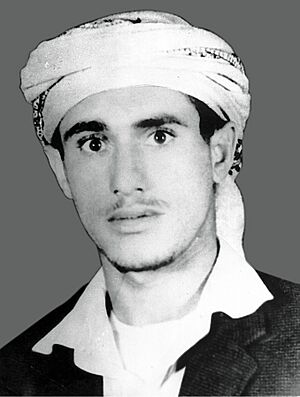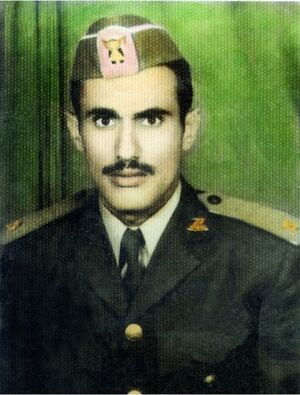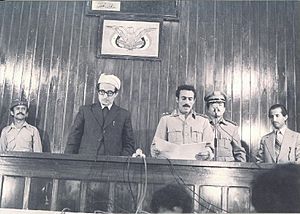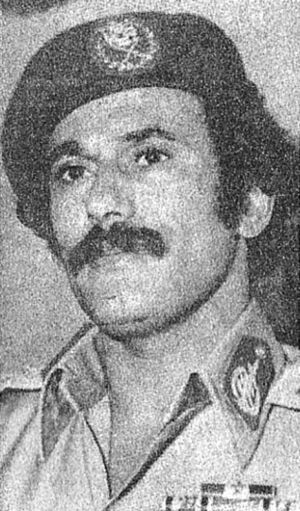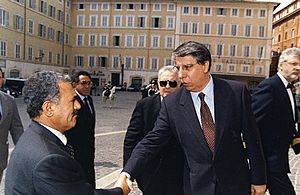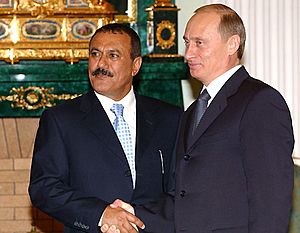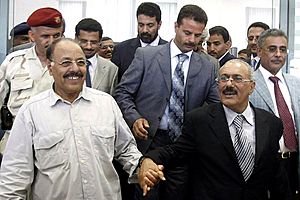Ali Abdullah Saleh facts for kids
Quick facts for kids
Ali Abdullah Saleh
|
|
|---|---|
| علي عبدالله صالح | |
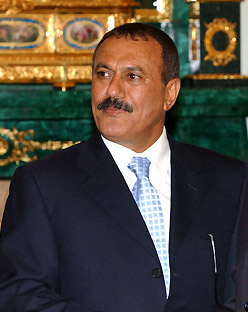
Saleh in the Kremlin, 2004
|
|
| 1st President of Yemen | |
| In office 22 May 1990 – 27 February 2012 |
|
| Prime Minister |
|
| Vice President |
|
| Preceded by |
|
| Succeeded by | Abdrabbuh Mansur Hadi |
| President of North Yemen | |
| In office 18 July 1978 – 22 May 1990 |
|
| Prime Minister |
|
| Vice President | Abdul Karim Abdullah al-Arashi |
| Preceded by | Abdul Karim Abdullah al-Arashi |
| Succeeded by | Himself as President of Yemen |
| Chairman of the General People's Congress | |
| In office 24 August 1982 – 4 December 2017 Disputed with Abdrabbuh Mansur Hadi starting 21 October 2015 |
|
| Preceded by | Party established |
| Succeeded by | Sadeq Amin Abu Rass |
| Personal details | |
| Born | 21 March 1947 Beit al-Ahmar, Sanhan District, Mutawakkilite Kingdom of Yemen |
| Died | 4 December 2017 (aged 70) outskirts of Sanaa, Yemen |
| Cause of death | Assassination |
| Political party | General People's Congress |
| Spouse |
Asma
(m. 1964) |
| Children | 7, including Ahmed |
| Military service | |
| Allegiance | |
| Years of service | 1958–2017 |
| Rank | Field marshal |
| Battles/wars |
|
Ali Abdullah Saleh (born March 21, 1947 – died December 4, 2017) was an important politician in Yemen. He was the first President of a united Yemen, serving from May 22, 1990, until he stepped down on February 25, 2012. Before that, he was the President of North Yemen (officially called the Yemen Arab Republic) from July 1978 to May 22, 1990. He became president after the previous leader, Ahmad al-Ghashmi, was killed.
During his time as president, Saleh worked closely with Western countries, especially the United States. This was often related to fighting against certain extremist groups. In 2011, many protests spread across the Middle East and North Africa, known as the Arab Spring. These protests also reached Yemen, making Saleh's position difficult. He eventually had to leave office in 2012. Abdrabbuh Mansur Hadi, who had been his vice-president, took over as the new president.
In 2015, during the Yemeni Civil War, Saleh joined forces with a group called the Houthis. Together, they took control of Yemen's capital city, Sana'a. This caused President Hadi to resign and leave the country. However, in December 2017, Saleh announced that he was no longer allied with the Houthis. Instead, he decided to side with his former opponents, including Saudi Arabia and President Hadi.
On December 4, 2017, a battle broke out in Sana'a between Houthi supporters and Saleh's followers. The Houthis accused Saleh of betrayal. He was killed by a Houthi sniper while trying to leave his home. His party, however, said he was executed at his house.
Contents
Early Life and Military Career
Ali Abdullah Saleh was born on March 21, 1947. He came from a poor family in a village called Beit al-Ahmar, which is about 20 kilometers southeast of Yemen's capital, Sana'a. His father passed away when Ali was young. Later, his mother married his uncle, Muhammad Saleh, who became an important guide for him. Ali's brother, Mohammed, was a Major General, and his nephews also held important positions during his rule.
Saleh started his education in Ma'alama village. At the age of 11, in 1958, he joined the North Yemeni Armed Forces as an infantry soldier. He then went to the North Yemen Military Academy in 1960. By 1963, he became a second lieutenant in the Armoured Corps. He took part in a military takeover in 1962 that removed the king and established the Yemen Arab Republic. During the North Yemen Civil War, he served in the Tank Corps and became a major by 1969.
He continued his military training in Iraq from 1970 to 1971 and was promoted to lieutenant colonel. By 1976, he became a full colonel and was put in charge of a military brigade. In 1977, the President of North Yemen, Ahmed bin Hussein al-Ghashmi, made him the military governor of Ta'izz.
Becoming President
After President al-Ghashmi was killed on June 24, 1978, Colonel Saleh became a member of a four-person council that temporarily led the country. On July 17, 1978, the Parliament chose Saleh to be the President of the Yemen Arab Republic. He also held the top positions in the armed forces.
Some people say that Saleh came from a humble background, not from a powerful family or tribe. He rose to power by building a system where he placed his family members in important government jobs. His seven brothers and later his sons and nephews were given key roles. He also relied on the loyalty of his own Sanhan tribe and another tribe, Hamdan San'a.
Leading North Yemen
On August 10, 1978, Saleh ordered the punishment of 30 officers who were accused of plotting against him. He was promoted to major general in 1980. In 1982, he was chosen as the leader of the General People's Congress party. He was re-elected as president of North Yemen in 1983.
During the 1980s, Saleh worked to improve relations with neighboring countries. He also started programs to help Yemen's economy and political system grow. He created the General People's Congress (GPC) party, which became his main political group. Yemen also began to develop its oil industry during this time.
Towards the end of the 1980s, there was international pressure on Yemen to allow its Jewish citizens to travel freely. Eventually, they were given passports, which allowed them to travel without restrictions.
President of Unified Yemen
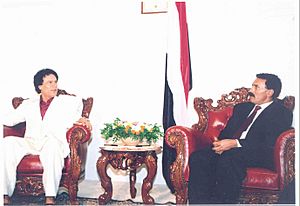
When the Soviet Union became weaker, it affected South Yemen. So, in 1990, North and South Yemen decided to unite after many years of talks. South Yemen accepted Saleh as the President of the new, unified country. Ali Salim al-Beidh became the Vice President.
After the Gulf War, many Yemeni workers who had been living in Kuwait were sent back home.
In the 1993 parliamentary election, which was the first election after unification, Saleh's General People's Congress party won the most seats.
Military Promotion and Elections
On December 24, 1997, the Parliament approved Saleh's promotion to the highest military rank, field marshal. This made him the highest-ranking military officer in Yemen.
He became Yemen's first directly elected president in the 1999 presidential election. He won with a very high percentage of the votes. The only other candidate was Najeeb Qahtan Al-Sha'abi, who was the son of a former president of South Yemen.
After the 1999 elections, a law was passed that made presidential terms longer, from five to seven years. It also made parliamentary terms longer, from four to six years. A new council of advisors with law-making power was also created, and the president appointed its members.
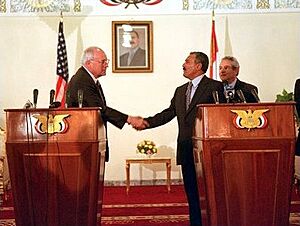
In July 2005, Saleh announced that he would not run for president in the September 2006 elections. He said he hoped that new, younger leaders would come forward. However, in June 2006, he changed his mind and accepted his party's nomination to run again. He said he was responding to "popular pressure" from the Yemeni people.
In the 2006 Yemeni presidential election, held on September 20, Saleh won with 77.2% of the votes. His main opponent received 21.8%. Saleh was sworn in for another term on September 27.
In 2005, Saleh claimed that he had personally stopped the U.S. from occupying the port of Aden after the 2000 USS Cole bombing. He said there were many U.S. warships nearby. However, U.S. records show that no other warships were in the area at that time.
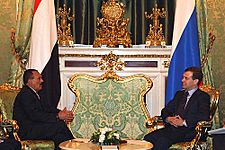
After the September 11 attacks in the U.S., Saleh sided with America in the global fight against terrorism. There were some reports that suggested Saleh's government might have had connections with certain extremist groups. These reports claimed that some officials might have helped these groups.
Leaving the Presidency
Protests and Challenges
In early 2011, protests began in Yemen, similar to those happening in other Arab countries. People demanded that Saleh end his long rule because of concerns about democracy, corruption, and human rights. Saleh's wealth was estimated to be very large, with money in many countries.
On February 2, 2011, facing widespread protests, Saleh announced that he would not seek re-election in 2013. He said he would finish his current term. However, protests continued. On March 18, at least 52 people were killed and many injured when government forces fired on unarmed protesters in Sana'a. The president denied that his security forces were involved.
On April 23, 2011, Saleh agreed to step down under a plan that would give him protection from being charged with crimes. He planned to hand over power to his vice president, Abdrabbuh Mansur Hadi. However, on May 23, Saleh refused to sign the agreement, which led to more protests.
Bomb Attack and Resignation
On June 3, 2011, Saleh was injured in a bomb attack at his presidential compound. The explosion happened in a mosque where he and other government officials were praying. Four bodyguards were killed, and many important officials were injured. Saleh suffered burns and injuries from shrapnel. He was taken to a military hospital in Saudi Arabia for treatment. U.S. officials said he had a collapsed lung and burns on about 40 percent of his body.
On June 4, 2011, Vice President Abdrabbuh Mansur Hadi became the acting president while Saleh recovered. On July 7, 2011, Saleh appeared on television for the first time since his injury. He looked badly burned and his arms were bandaged. He said he was open to sharing power but within the rules of the constitution.
On September 23, 2011, Yemeni state television announced that Saleh had returned to the country after three months. His return came during a week of increased fighting in Sana'a, which caused over 100 deaths.
On November 23, 2011, Saleh flew to Riyadh, Saudi Arabia, to sign a plan for political change. He had previously refused to sign this plan. By signing it, he agreed to officially transfer his presidential powers to his deputy, Vice President Abdrabbuh Mansur Hadi. This agreement also led to a government shared between Saleh's party and opposition groups.
Saleh left Yemen on January 22, 2012, for medical treatment in New York City. On February 27, 2012, he formally gave up power to Abdrabbuh Mansur Hadi. He promised to support efforts to rebuild Yemen, which was still recovering from months of conflict.
After the Presidency
In February 2013, Saleh opened a museum in Sana'a to show items from his 33 years in power. One display included a pair of burnt trousers he was wearing during the bomb attack in 2011. Other displays showed pieces of shrapnel removed from his body and gifts he received from world leaders.
Later that year, a United Nations official said that Saleh and his son had the right to run in future Yemeni presidential elections.
Saleh played a role behind the scenes in the Houthi takeover in Yemen. Tribes and government forces loyal to Saleh joined the Houthis as they gained power. In 2014, the United Nations Security Council placed restrictions on Saleh, saying he was threatening peace. These restrictions included a travel ban and freezing his money. On July 28, 2016, Saleh and the Houthi rebels announced they were officially working together to fight the Saudi-led military group.
Death
The alliance between Saleh and the Houthis broke down in late 2017, leading to armed clashes in Sana'a. On December 2, Saleh announced on television that he was no longer allied with the Houthi movement. He called on his supporters to take back the country and said he was open to talking with the Saudi-led group.
On December 4, 2017, Houthi fighters attacked Saleh's house in Sana'a. Saleh was killed while trying to escape towards Marib. His vehicle was hit by a rocket, and he was then shot. The Houthis released a video that they said showed Saleh's body. His death was confirmed by his close helpers and his nephew. His death was seen as a significant event in the ongoing conflict.
Saleh's home was taken by Houthis before he fled. Officials from his party said that a group he was traveling with was attacked by Houthis as they tried to reach his hometown. The Houthi leader celebrated Saleh's death, calling it "the day of the fall of the treasonous conspiracy." He also said his group had no issues with Saleh's party members. Abdrabbuh Mansur Hadi expressed sadness about Saleh's death and called for people to rise up against the Houthis.
On December 9, 2017, Saleh was buried in Sana'a. A Houthi commander said that the burial was small, with no more than 20 people attending.
Honors
National honors
 Yemen: Grand Master with Collar of the Order of Unification
Yemen: Grand Master with Collar of the Order of Unification
Foreign honors
 Cuba: Medal of the Order of José Martí
Cuba: Medal of the Order of José Martí Libya: First Class of the Order of the Grand Conqueror
Libya: First Class of the Order of the Grand Conqueror Tunisia: Grand Cordon of the Order of the Seventh of November
Tunisia: Grand Cordon of the Order of the Seventh of November United Arab Emirates: Collar of the Order of Zayed
United Arab Emirates: Collar of the Order of Zayed Two Sicilies Kingdom of the Two Sicilies (defunct honour)
Two Sicilies Kingdom of the Two Sicilies (defunct honour)
Wealth
A United Nations panel stated that by 2012, Saleh had gathered a large amount of wealth, estimated to be between $32 billion and $60 billion. This money was reportedly hidden in at least twenty different countries. The panel suggested that he gained about $2 billion each year from 1978 to 2012 through various illegal ways, such as taking money from government programs, like the fuel subsidy program.
Personal Life
Ali Abdullah Saleh married Asma Saleh in 1964 when he was seventeen years old. They had seven sons, including their eldest, Ahmed (born in 1972). Ahmed was a commander of the Republican Guard and was once thought to be a possible successor to his father.
His half-brother, General Mohamed Saleh al-Ahmar, was the commander of the Yemeni Air Force.
See Also
 In Spanish: Alí Abdalá Salé para niños
In Spanish: Alí Abdalá Salé para niños
- 1994 civil war in Yemen
- Arab Spring
- Yemeni Civil War (2015–present)
- Battle of Sanaa (2017)
Images for kids
-
Saleh and George W. Bush in 2007
 | Selma Burke |
 | Pauline Powell Burns |
 | Frederick J. Brown |
 | Robert Blackburn |


